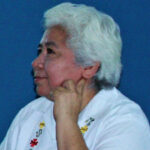–U k’i’ik’el ya’ u k’eexe yéetel u k’i’ik’el wíinik, u bo’otbil ti’ ts’u’ k’áax –ku ya’alik xTuux tun yisíinsik le jkimeno’ , ka tu ts’a’ u ja’il yichkíil tu’ux ku cha’akal u yiits le ya’o’.
U k’iinik agosto, tun chúunsiko’ob u meyaj u jóok’siko’ob u yiits le ya’o’. Mixmáak ts’a’ u na’ati’ u kuchko’ob le jkimeno’utia’al u jóok’siko’ob ti’ k’áax, ya’ab k’iin u xíimbalil je’el tu’utal tio’ob tumen jach náach u xíimbata’al tak yéetel tsíimin náach u bejil. Ka te’ep’i yéetel u teep’el, ka tu láak’into’ob buul áak’ab tak tu yuk’o’ob u chukwa’il beeta’ab yéetel a ja’il tu’ux tu yisíinsaj le jkimeno’ . ¡Ba’ax u jeel u k’áat áanimas jMaako!
Tu jo’oloje’, tu píik’ sáastal, ka tu biso’ob ti’ juntséel ti’ le nojoch hato , tu’ux ku meyajo’ob ka tu muukkinso’ob tuunich yóok’o’. XTuuxe’ jach tu yaj óoltaj tumen jMaakoe’ yaan u yatam yéetel u paalal yéetel juntúule’ ma’ síijiki’. Tak tun tuklik tu kúuchil tu’ux ku jóok’sa’al u yiits le ya’o’ mix bik’in u k’a’ajsik u Janal Pixan, tumen tu ts’u’ noj k’áaxe’ kex ya’ab máak ku kimile’mun beeta’al u Janal Pixan mixmáak. U pixan jMaako chéen tu juunal kun bin u máan u k’áat yo’och ch’uykinsa’an tu k’ab che’ wa tu joolnaj.
Ka’aj máan k’iine’, ka ts’o’ok u meyaj le jóok’sa’ u yiits le ya’o’ ka tu líik’suba’ob utia’al u suut tu kaajalo’ob, xTuux bin tu’ ux mu’uke áanimas jMaako ka tu ya’alaj ti’ yéetel tuláakal u yóol u puksi’ik’al:
–Táanil Ki’ichkelem Yuum, jMaako’, wa kuxa’anen ti’ u jeel ja’ab, le k’iin ken suunaken yaan in bisik a baakel utia’al ka mu’ukkech tu’ux muka’an a wéet ch’ i’ibalo’ob: jPiil, xMaas, jDol, xSep. Yaan xan u beeta’al, kex ich óotsilil, a ki’iki’ wo’och janal tu k’iinil kili’ich áanimas .
Ti’ lelo’, ka ka’a suunajo’ob meyaj ka k’uucho’ob naats’ tu’ux muka’an áanimas jMaako ka meyanajo’ob tuláakal le k’iino’ ti’ ch’ak ya’o’. U k’iinil diciembre ka ts’o’ok u meyjo’ch’ak ya’, xTuux bin tu’ux mu’uk jMaako. Bey peek’e’ tun jáalik u muk baak, ka tu bajubaj u láaj luk’se tuuncho’obo’ ka tu machaj u baakel ka tu jaats’lantaj ka tu ch’akaj u le’ ch’iit, ka tu to’aj le baako’obo’, ka tu but’aj tu kúuchil tu’ux ku meen janal.
“La sangre del zapota a cambio de la sangre del chicle”, reflexionaba doña xTuux mientras limpiaba el cuerpo y levantaba con cuidado el agua de la bañera en uno de los cuencos de goma.
Era principios de agosto y la temporada de trabajo apenas comenzaba. Nadie se ofreció a trasladar el cadáver al pueblo; es más, el cuerpo no resistió la descomposición ya que el viaje duró muchos días a caballo, por lo que lo envolvieron en su manta y esa noche, mientras lo velaban, cada uno de los presentes lo ayudó a perdonar sus pecados, bebiendo chocolate. preparado con el agua de su baño. ¡Qué más podría pedir un hombre muerto!
Al día siguiente, muy temprano, enterraron a Maco a un costado del campamento. No había picos para cavar, así que simplemente colocaron un montículo de piedras sobre el cuerpo. XTuux estaba turbada: pensaba en la viuda, en los huérfanos y en el hijo por nacer del muerto, pero también la angustiaba el pensamiento de que nadie le pondría mesa en los Días de Muertos, porque allá arriba en el montañas, a pesar de toda la muerte, no celebraron el Día de los Muertos. Maco sería un “alma solitaria” mendigando la comida colgada entre las ramas de los árboles o en las puertas de las casas.
Cuando terminó la temporada y los chicleros se disponían a regresar a sus respectivas comunidades, la cocinera se acercó a la tumba del muerto y, desde el fondo de su corazón, prometió:
“Te juro por Dios, Maco, que si me da vida para volver el año que viene, descansarás con tus mayores, con don Pil, doña xMas, don Dol, y doña xSep, y en el mes de los Fieles Muertos, aunque no haya mucho, tendrás tu mesa con las cosas que te gustaban comer.”
Al año siguiente, cuando terminó la temporada de chicles, xTuux tomó su machete en el puño y fue a la tumba de Maco. Como un perro desenterrando huesos, rascó y rascó hasta encontrar el esqueleto, sacó los huesos y los clasificó en largos, pequeños y redondos. Llevó los montones a sus utensilios de cocina y los envolvió en hojas de palma ch’iit , luego los metió en sus ollas. Los ató a un caballo y la caravana partió hacia su destino.
Traducido por Arthur Dixon
De la novela U k’a’ajsajil u ts’u’ noj k’áax / Recuerdos del corazón de la montaña .





